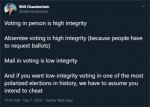- Joined
- Dec 1, 2017
- Messages
- 24,476
- Reaction score
- 7,808
- Gender
- Undisclosed
- Political Leaning
- Undisclosed
ALEC Exposed: Rigging Elections | The Nation
State Representative Robin Vos, Republican co-chair of the powerful Legislative Joint Finance Committee, determined that making it harder for college students, seniors and low-income citizens to vote was an immediate legislative priority, and pressed lawmakers to focus on enacting one of the most restrictive voter ID laws in the nation.
As ALEC’s chair for Wisconsin, Vos was doing what was expected of him. Enacting burdensome photo ID or proof of citizenship requirements has long been an ALEC priority. ALEC and its sponsors have an enduring mission to pass laws that would make it harder for millions of Americans to vote, impose barriers to direct democracy and let big money flow more freely into campaigns.
Republicans have argued for years that “voter fraud” (rather than unpopular policies) costs the party election victories. A key member of the Corporate Executive Committee for ALEC’s Public Safety and Elections Task Force is Sean Parnell, president of the Center for Competitive Politics, which began highlighting voter ID efforts in 2006, shortly after Karl Rove encouraged conservatives to take up voter fraud as an issue. Kansas
Republican Kris Kobach, who along with ALEC itself helped draft Arizona’s anti-immigration law, has warned of “illegally registered aliens.” ALEC’s magazine, Inside ALEC, featured a cover story titled “Preventing Election Fraud” following Obama’s election.
Shortly afterward, in the summer of 2009, the Public Safety and Elections Task Force adopted voter ID model legislation. And when midterm elections put Republicans in charge of both chambers of the legislature in twenty-six states (up from fifteen), GOP legislators began moving bills resembling ALEC’s model.
State Representative Robin Vos, Republican co-chair of the powerful Legislative Joint Finance Committee, determined that making it harder for college students, seniors and low-income citizens to vote was an immediate legislative priority, and pressed lawmakers to focus on enacting one of the most restrictive voter ID laws in the nation.
As ALEC’s chair for Wisconsin, Vos was doing what was expected of him. Enacting burdensome photo ID or proof of citizenship requirements has long been an ALEC priority. ALEC and its sponsors have an enduring mission to pass laws that would make it harder for millions of Americans to vote, impose barriers to direct democracy and let big money flow more freely into campaigns.
Republicans have argued for years that “voter fraud” (rather than unpopular policies) costs the party election victories. A key member of the Corporate Executive Committee for ALEC’s Public Safety and Elections Task Force is Sean Parnell, president of the Center for Competitive Politics, which began highlighting voter ID efforts in 2006, shortly after Karl Rove encouraged conservatives to take up voter fraud as an issue. Kansas
Republican Kris Kobach, who along with ALEC itself helped draft Arizona’s anti-immigration law, has warned of “illegally registered aliens.” ALEC’s magazine, Inside ALEC, featured a cover story titled “Preventing Election Fraud” following Obama’s election.
Shortly afterward, in the summer of 2009, the Public Safety and Elections Task Force adopted voter ID model legislation. And when midterm elections put Republicans in charge of both chambers of the legislature in twenty-six states (up from fifteen), GOP legislators began moving bills resembling ALEC’s model.

